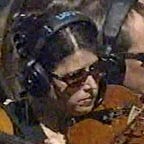2019 SCSM Graduate Student Prize
Story by Joel West
Sonja Wermager, “‘That Hart May Sing in Corde:’ Poetic Paraphrase of the Psalms as Defense of Church Music in Matthew Parker’s The Whole Psalter Translated into English Metre (1567)”
The Society for Christian Scholarship in Music is pleased to introduce Sonja Wermager, a third-year PhD student in Historical Musicology at Columbia University and recipient of this year’s Graduate Student Prize. Sonja’s selection was announced at the SCSM business meeting this past February at the University of St. Michael’s College in the University of Toronto, Canada.
Her paper was selected by a committee chaired by Cathy Ann Elias (DePaul University) that also included Michael Alan Anderson (Eastman School of Music), Jonathan Kregor (College-Conservatory of Music, University of Cincinnati) and consultant Peter Mercer-Taylor (University of Minnesota).
After growing up in Northfield, Minnesota, Wermager earned a BA in Music and History at St. Olaf College. She then received a scholarship to the University of Birmingham (UK), where she completed a Masters in Renaissance, Reformation, and Early Modern Studies. Her current research considers religious music, especially mass settings, in the context of nineteenth-century Kunstreligion. Beyond research and teaching, she enjoys cooking, running, British murder mystery shows, and playing chamber music with friends.
Drawing on her master’s thesis, her prize-winning paper provided a window into the oft-disputed theology of the sixteenth-century English Reformation, and in particular, the early reign of Elizabeth I, who became the fourth sovereign in a decade with the death of her sister Mary Tudor.
Wermager studied the book of psalms paraphrased by Matthew Parker, Elizabeth’s first archbishop of Canterbury from 1559 until his death in 1575. She explained how chanting the psalms was an acceptable compromise for both the Reformed and Catholic factions of the English church. At the same time, the (proto-Puritan) expatriates returning from Geneva brought back strong Calvinist beliefs on what should and should not be sung in church — which would later lead to the smashing of choir stalls and organs by Cromwell’s army during the English Civil War.
Parker’s The Whole Psalter Translated provided both a set of psalms suitable for singing, as well as a window into his theology. The book included four-part settings for eight psalms by Catholic composer Thomas Tallis — one of which was made famous by Vaughan Williams in his Fantasia on a Theme by Thomas Tallis. Wermager played two recordings in order to demonstrate the contrast between the austere unison singing of the Genevan Psalter with the rich harmonies of a Tallis setting.
Her presentation focused on the theology of four psalms that specifically mention music: Psalms 9, 57, 92, and 150. By comparing Parker’s original manuscript (held at the Inner Temple Library in London) to the 1567 published edition, Wermager showed how Parker changed the paraphrase in Psalm 67 to allow for instrumental accompaniment.
She also contrasted his psalter to two Calvinist metrical paraphrases — the Genevan Psalter and the popular Whole Booke of Psalms by Sternhold and Hopkins. Compared to the Calvinist texts, Parker’s versions of Psalm 92 and Psalm 150 emphasized instruments — including modern instruments — and even (consistent with 2 Samuel 6:14) dancing.
While Parker’s book sold poorly, he established Elizabeth’s middle way for the theology of worship as the norm in the English church for centuries to come. Wermager concluded by reading Parker’s closing collect from The Whole Psalter Translated, addressed to “Most laudable and merciful God, the sweet tenor of all our harmony.”
The SCSM Graduate Student Prize is awarded annually to a graduate student for a distinguished scholarly paper presented at the annual meeting of the Society. Recent recipients have included Andrew Janzen (2018) for “The Good Road: Indigenous Christian Songs, Senses and Place of Identity”; Emilie Coakley (2017) for “Time for Prayer or Time for Work?: Nostalgia, Memory, and the Changing Reception of Church Bells in a City Soundscape”; Braxton Shelley (2016) for “Tuning Up: Towards a Gospel Aesthetic”; Bo kyung Blenda Im (2015) for “Amnesia and Anamnesis: Voicing an Alternative Modern Christian Subjectivity in South Korea”; and Cesar Favila (2014) for “Sacred Music and Its Sacred Space: The Early Modern Novohispanic Convent Coro.” The prize is open to all graduate students whose papers are accepted for presentation at the meeting.
Joel West is a student at Cranmer Theological House, a traditional Anglican school of ministry operated under the auspices of the Diocese of Mid-America of the Reformed Episcopal Church. He maintains the blog http://anglicanmusic.blogspot.com.
